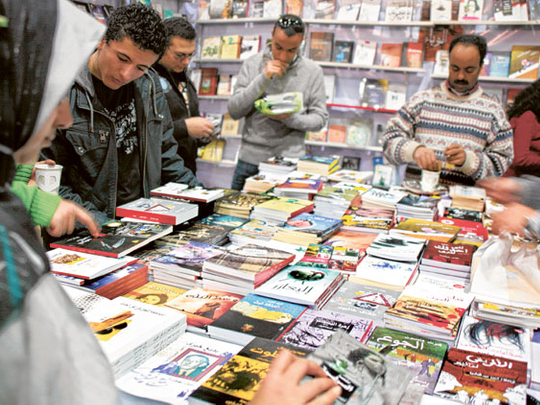
Cairo: Poking fun at everything from the president's almost 30-year rule to the capital's frenetic traffic, satirical books are filling more shelf space in Egypt's bookshops and reflecting the frustrations of a young generation.
"There must be a solution," with a caricature of a jaded, unkempt citizen leaning up against a garbage can on its cover, and "Egypt is not my mother, she's my stepmother", punning the local idiom "Masr Umm Al Donia" [Egypt is the mother of the world] are among the more popular works.
Limited outlets for political expression, state crackdowns on organised dissent and a growing wealth gap in the Arab world's most populous state are fuelling demand for such literary satire, literary critics say.
"The more of a totalitarian rulership you have, the more oppression, the more satire you have," said literary critic Rabie Moftah.
"It is a form of resistance."
Satirical literature has long been a feature of Egypt's cultural scene. But it is now more commercial and accessible particularly to a younger audience by using street-wise Arabic and, some critics say, by becoming more slapstick.
With the exception of channels like the internet, there are few places for angry voices to express themselves in public in Egypt, where rights groups say an emergency law in place since Mubarak took office in 1981 has been used to stifle dissent in a country where street protests are quickly quashed.
For the state, such a cultural outlet for criticism offers a limited threat, when 30 per cent of the population is illiterate and book reading is not popular with the masses. A fifth of Egyptians earn less than $1 (Dh3.67) a day, the United Nations says.
"[The state] opens the lid a little so the pot doesn't explode," said Mohammad Khalil, lawyer and technical consultant for the National Council for Human Rights.
Cultural hub
Egypt, widely viewed as a cultural hub in the Arab world, published some 20,000 titles in 2009, according to the National Library and Archives, while Britain published around 130,000 titles the same year, according to Nielsen Book.
Literary critics and writers say the political environment provides fertile grounds for satire to grow.
"It's a big joke and closer to the theatre of the absurd," Bilal Fadl, author and columnist for the daily opposition paper Al Masry Al Youm, said when describing Egypt's political life and how it helps give him inspiration. Egypt has a history of literary satirists. The biggest names include Ahmad Ragab and Mahmoud Al Sa'adan, both renowned for their humorous social and political commentary.
"You are dealing with a nation where powerful, sharp and sometimes scathing satire is a way of life," says Fadl.
But now it permeates pop culture — books, music and films — although critics say it has often sunk to kitsh or slapstick humour, appealing to an audience seeking easy comic relief.
"Most of the satirical writing is not literature, but rather collections of one-liners," said journalist Ahmad Naje, 25, grumbling that new works often criticise without making positive calls for youth action, even if they draw the young to books.
Wide wealth disparities fuel the genre in Egypt, where the rich retreat to gated housing developments shutting out the slums of the capital.
Cairo (Reuters) Satirical writing grows in the presence of screaming contradictions, meaning big gaps between rich and poor, between intellectuals and regular citizens according to literary critic Rabie Moftah.
In his book Oh...Egypt! A Satirical Vision, author Nabeel Farouk writes: "Even children take part in the Intifadah of internal resistance, by ripping a seat on a public bus, or scratching a luxury car on the street."
Religious ideology can also polarise and provides fertile ground for commentary. Moftah says many youths struggle to find an identity in the mainly Muslim country, where strict Salafi versions of Islam emanating from states like Saudi Arabia vie with more liberal Western trends on TV or the internet.
"There's no homogeneity. Some are listening to [the] Quran 24 hours, other are listening to pop music all day," Moftah said.











